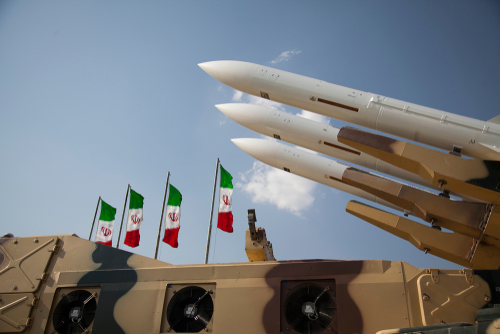Iran’s regime teeters on the brink of collapse after U.S. airstrikes destroyed nuclear facilities, with opposition forces now gaining momentum. Could America’s longtime Middle Eastern adversary finally be facing a reckoning that reshapes regional power dynamics? Following the Israel-Iran ceasefire, regime change could happen without the U.S. sending a single troop overseas.
At a glance:
• U.S. B-2 airstrikes destroyed Iranian nuclear facilities
• Exiled Iranian opposition groups believe the regime is weakening and could collapse under continued pressure
• Iranian Supreme Leader Ayatollah Ali Khamenei’s grip on power appears to be slipping amid growing internal discontent
• The Iranian regime faces severe economic problems including high inflation, poverty, and corruption
• A potential regime change could lead to regional stability and improved diplomatic relations in the Middle East
Opposition Forces Gaining Strength
Israeli and American military strikes have significantly weakened Iran’s theocratic regime, creating new opportunities for opposition groups. And now that Israel and Iran have agreed to a ceasefire, there’s no telling what new groups may attempt to take control in Iran.
Exiled Iranian leaders are increasingly vocal about the possibility of regime change as the Islamic Republic faces unprecedented external pressure and internal discontent.
For the first time in decades, the fall of Iran’s regime seems not just imaginable—but imminent. “The Islamic Republic has come to its end and is collapsing,” said Reza Pahlavi, son of the Shah, Iran’s deposed leader. @EliLake reports: https://t.co/AxY2hiGrQv
— The Free Press (@TheFP) June 23, 2025
Kurdish leader Kawsar Fattahi, who heads an outlawed Iranian opposition party operating from Iraq, has stated unequivocally that “the regime is weakening day by day.” Her assessment comes as Israeli warplanes have conducted multiple strikes against Iranian nuclear and military installations, and after the U.S. destroyed Iran’s three main nuclear facilities with B-2 “bunker buster” strikes.
Fattahi’s organization is among several opposition groups positioned to challenge the authority of Supreme Leader Ayatollah Ali Khamenei, who has ruled Iran since the 1979 Islamic Revolution. The revolution replaced Iran’s pro-Western royal family with the current Islamic Republic that has been a persistent source of regional instability.
Reza Pahlavi: The Islamic Republic is collapsing. Khamenei’s family and top officials are preparing to flee.
Across Iran, the military is fractured, the people united. This 46-year tyranny is crumbling. 1/ pic.twitter.com/dsYL0AAje8
— Tymofiy Mylovanov (@Mylovanov) June 23, 2025
Economic Collapse Fueling Discontent
The Iranian regime faces not only external military pressure but also severe internal economic challenges that have eroded public support. Rampant inflation, widespread poverty, and systemic corruption have created conditions ripe for revolutionary change within Iran’s borders.
Israeli Prime Minister Benjamin Netanyahu has directly called for Iranians to rise against their government, declaring, “Brave people of Iran, your light will defeat the darkness.” This message resonates with many Iranians who have participated in mass protests against the regime in recent years.
Crown Prince Reza Pahlavi, son of the last Shah and living in exile, has reported that “informed sources inside the country who have been in contact with me say that the regime’s command and coordination structures are breaking down at a remarkable pace.” His statement suggests the potential for a leadership vacuum as the regime struggles to maintain control.
Regional Stability at Stake
The potential collapse of Iran’s regime could dramatically reshape Middle East dynamics by eliminating a major source of regional instability. Iran has long supported proxy militant groups including Hamas, Hezbollah, and Houthi rebels, fueling conflicts across multiple countries.
German Chancellor Friedrich Merz acknowledged Israel’s critical role in addressing the Iranian threat, stating that “Israel is doing the dirty work for all of us.” This sentiment reflects growing international recognition that Iran’s nuclear ambitions threaten not only Israel but also Sunni Arab states, Europe, and the United States.
Financial markets have remained surprisingly stable despite the military actions, suggesting that investors believe the conflict – and now the ceasefire agreed by Iran and Israel – will potentially lead to positive regional changes. A post-regime Iran could create opportunities for improved diplomatic relations throughout the Middle East, including progress on the Israeli-Palestinian conflict.
Opposition leaders emphasize they seek a democratic, secular Iran rather than foreign-imposed regime change. Both Fattahi’s group and Crown Prince Pahlavi have reportedly been in discussions with U.S. officials about Iran’s future, though specific details remain confidential.
Click this link for the original source of this article.
Author: Editorial Team
This content is courtesy of, and owned and copyrighted by, https://www.conservativecardinal.com and its author. This content is made available by use of the public RSS feed offered by the host site and is used for educational purposes only. If you are the author or represent the host site and would like this content removed now and in the future, please contact USSANews.com using the email address in the Contact page found in the website menu.








